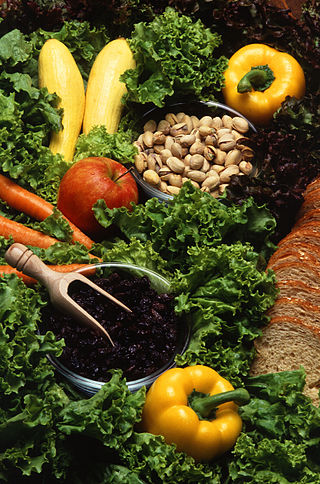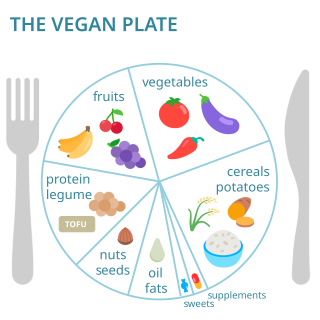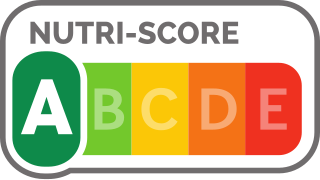
Iron deficiency, or sideropenia, is the state in which a body lacks enough iron to supply its needs. Iron is present in all cells in the human body and has several vital functions, such as carrying oxygen to the tissues from the lungs as a key component of the hemoglobin protein, acting as a transport medium for electrons within the cells in the form of cytochromes, and facilitating oxygen enzyme reactions in various tissues. Too little iron can interfere with these vital functions and lead to morbidity and death.

Vegetarian nutrition is the set of health-related challenges and advantages of vegetarian diets.

Vitamin B12, also known as cobalamin, is a water-soluble vitamin involved in metabolism. It is one of eight B vitamins. It is required by animals, which use it as a cofactor in DNA synthesis, and in both fatty acid and amino acid metabolism. It is important in the normal functioning of the nervous system via its role in the synthesis of myelin, and in the circulatory system in the maturation of red blood cells in the bone marrow. Plants do not need cobalamin and carry out the reactions with enzymes that are not dependent on it.

Antinutrients are natural or synthetic compounds that interfere with the absorption of nutrients. Nutrition studies focus on antinutrients commonly found in food sources and beverages. Antinutrients may take the form of drugs, chemicals that naturally occur in food sources, proteins, or overconsumption of nutrients themselves. Antinutrients may act by binding to vitamins and minerals, preventing their uptake, or inhibiting enzymes.

Vegan nutrition refers to the nutritional and human health aspects of vegan diets. A well-planned vegan diet is suitable to meet all recommendations for nutrients in every stage of human life. Vegan diets tend to be higher in dietary fiber, magnesium, folic acid, vitamin C, vitamin E, and phytochemicals; and lower in calories, saturated fat, iron, cholesterol, long-chain omega-3 fatty acids, vitamin D, calcium, zinc, and vitamin B12.
Relatively speaking, the brain consumes an immense amount of energy in comparison to the rest of the body. The mechanisms involved in the transfer of energy from foods to neurons are likely to be fundamental to the control of brain function. Human bodily processes, including the brain, all require both macronutrients, as well as micronutrients.
Nutrition psychology (NP) is the psychological study of the relationship between dietary intake and different aspects of psychological health. It is an applied field that uses an interdisciplinary approach to examine the influence of diet on mental health. Nutrition psychology seeks to understand the relationship between nutritional behavior and mental health/well-being NP is a sub-field of psychology and more specifically of health psychology. It may be applied to numerous different fields including: psychology, dietetics, nutrition, and marketing. NP is a fairly new field with a brief history that has already started to contribute information and knowledge to psychology. There are two main areas of controversy within nutrition psychology. The first area of controversy is that the topic can be viewed in two different ways. It can be viewed as nutrition affecting psychological functions, or psychological choices and behavior influencing nutrition and health. The second controversy is the defining of what is "healthy" or "normal" as related to nutrition.
Clare Elizabeth Collins is an Australian dietician who is Professor of Nutrition and Dietetics at the University of Newcastle. She serves as Director for Research in the School of Health Sciences and Deputy Director of the Priority Research Centre. She was awarded the 2017 Hunter Medical Research Institute Researcher of the Year and is a Fellow of Dietitians Australia.

The Nutri-Score, also known as the 5-Colour Nutrition label or 5-CNL, is a five-colour nutrition label and nutritional rating system, and an attempt to simplify the nutritional rating system demonstrating the overall nutritional value of food products. It assigns products a rating letter from A (best) to E (worst), with associated colors from green to red.
The first 1,000 days describes the period from conception to 24 months of age in child development. This is considered a "critical period" in which sufficient nutrition and environmental factors have life-long effects on a child's overall health. While adequate nutrition can be exceptionally beneficial during this critical period, inadequate nutrition may also be detrimental to the child. This is because children establish many of their lifetime epigenetic characteristics in their first 1,000 days. Medical and public health interventions early on in child development during the first 1,000 days may have higher rates of success compared to those achieved outside of this period.
Sheila A. Skeaff is a Canadian-born New Zealand nutritionist and full professor at the University of Otago. Her research focusses on food literacy, sustainable diets and iodine deficiency.
Rachel C. Brown is a New Zealand scientist, professor and deputy head of the Department of Human Nutrition at the University of Otago.

Carol Anne Wham is a New Zealand scientist and professor of public health nutrition at Massey University.
Jane Coad is a New Zealand public health nutrition researcher and professor in nutrition at Massey University. She is co-director of Massey's Vitamin D Research Centre which she and Pam von Hurst founded in 2010.

Marie Wong is a New Zealand academic food technologist, and as of 2020 is a full professor at Massey University.

Pamela Ruth von Hurst is a New Zealand academic and is a full professor at Massey University, specialising in human nutrition.

Cathryn Anne Conlon is a New Zealand academic, and is a full professor at Massey University, specialising in maternal and early-life nutrition.

Christine Dumont Thomson is a New Zealand nutritionist and academic, and is professor emerita at the University of Otago. Before her retirement in 2010 she researched iodine and selenium dietary deficiencies.
Anne-Louise M. Heath is a New Zealand academic, and is a full professor at the University of Otago, specialising in baby and infant nutrition, including baby-led weaning and iron deficiency.
Rozanne Kruger is a South African academic and registered dietitian, and is a full professor at Griffith University, specialising in developing new dietary assessment strategies, to examine patterns of dietary intake and behaviour, and training dietitians.











